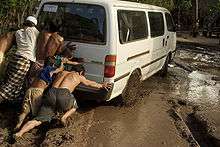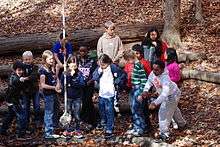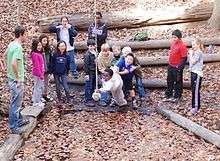Teamwork

_haul_in_a_mooring_line_while_mooring_the_ship_in_Faslane%2C_Scotland.jpg)



In healthcare, teamwork is "a dynamic process involving two or more healthcare professionals with complementary background and skills, sharing common health goals and exercising concerted physical and mental effort in assessing, planning, or evaluating patient care".[1] Having followed a volatile trend in the past century, the societal diffusion and application of teamwork has shown a sharp increase since the late 1970s.[2]
In a business setting, accounting techniques may be used to provide financial measures of the benefits of teamwork which are useful for justifying the concept.[3] Health-care policy-makers increasingly advocate teamwork as a means of assuring quality and safety in the delivery of services; a committee of the Institute of Medicine recommended in 2000 that patient-safety programs "establish interdisciplinary team training programs for providers that incorporate proven methods of team training, such as simulation."[4]
In health care, a systematic concept analysis in 2008 concluded teamwork to be "a dynamic process involving two or more healthcare professionals with complementary backgrounds and skills, sharing common health goals and exercising concerted physical and mental effort in assessing, planning, or evaluating patient care."[5] Elsewhere teamwork is defined as "those behaviours that facilitate effective team member interaction", with "team" defined as "a group of two or more individuals who perform some work related task, interact with one another dynamically, have a shared past, have a foreseeable shared future, and share a common fate".[6] Another definition for teamwork proposed in 2008 is "the interdependent components of performance required to effectively coordinate the performance of multiple individuals"; as such, teamwork is "nested within" the broader concept of team performance, which also includes individual-level taskwork.[7] A 2012 review of the academic literature found that the word "teamwork" has been used "as a catchall to refer to a number of behavioral processes and emergent states".[8]
Processes
Researchers have identified 10 teamwork processes that fall into three categories:[9][10]
- transition process (between periods of action)
- mission analysis
- goal specification
- strategy formulation
- action process (when the team attempts to accomplish its goals and objectives)
- monitoring progress toward goals
- systems monitoring
- team monitoring and backup behavior
- coordination
- interpersonal process (present in both action periods and transition periods)
- conflict management
- motivation and confidence building
- affect management
Researchers have confirmed that performing teamwork generally works better when members of the team have experience working together due to enhanced coordination and communication.[11] This appears partly due to a chemical called serotonin, which helps an individual to communicate better and think more positively. Serotonin is produced when an individual is in a situation where he/she is in comfortable environment. Teams run more efficiently when the individual members communicate with the other members.
Training to improve teamwork
As in a 2008 review, "team training promotes teamwork and enhances team performance."[7] In specific, a 2014 meta-analysis of 45 published and unpublished studies concluded that team training is "useful for improving cognitive outcomes, affective outcomes, teamwork processes, and performance outcomes." Eduardo Salas, Deborah DiazGranados, Cameron Klein, C. Shawn Burke, Kevin C. Stagl, Gerald F. Goodwin, and Stanley M. Halpin.[12]
Benefits
- Problems solving: A single brain can’t bounce different ideas off of each other. Each team member has a responsibility to contribute equally and offer their unique perspective on a problem to arrive at the best possible solution.[13] Teamwork can lead to better decisions, products, or services. The quality of teamwork may be effective by analyzing the following six components of collaboration among team members: communication, coordination, balance of member contributions, mutual support, effort, and cohesion.[14] In one study, teamwork quality as measured in this manner correlated with team performance in the areas of effectiveness (i.e., producing high quality work) and efficiency (i.e., meeting schedules and budgets).[14] A 2008 meta-analysis also found a relationship between teamwork and team effectiveness.[10]
- Healthy competition: A healthy competition in groups can be used to motivate individuals and help the team excel.
- Developing relationships: A team that continues to work together will eventually develop an increased level of bonding. This can help people avoid unnecessary conflicts since they have become well acquainted with each other through teamwork.[13] Team members’ ratings of their satisfaction with a team is correlated with the level of teamwork processes present.[10]
- Everyone has unique qualities: Every team member can offer their unique knowledge and ability to help improve other team members. Through teamwork the sharing of these qualities will allow team members to be more productive in the future.
- In healthcare: teamwork is associated with increased patient safety.[15]
Things to avoid
.jpg)
- Teamwork may have an "unintended effect of fermenting hostility toward the managerial goal of making the teams fully self-managing."[3] In one case study of a clothing manufacturer, a switch from production line work (with bonuses given for individual performance) to teamwork (in which an individual's earnings depended on team performance) caused workers to resent having to monitor each other.[3]
- There is a potential of "social loafing" (i.e., an individual's doing less work in a team than what he/she would normally do working individually).[16] In order to minimize social loafing, management can make individual performance more visible while in a team setting. This can be done by forming smaller teams, specializing specific tasks to certain individuals, and measuring individual performance. Social loafing can also be reduced by increasing employee motivation, by selecting employees who have previously shown themselves to be motivated, and increasing job enrichment.[16] In experiments conducted in the 1990s, an increase in group cohesiveness appeared to decrease social loafing.[17][18]
Phrase
"Coming together is beginning, Keeping together is progress, Working together leads to success" (Working together is nothing but teamwork)
References
- ↑ "Teamwork". Merriam-Webster Dictionary online. Retrieved April 26, 2012.
- ↑ Weiss, M. & Hoegl, M. (2015). The History of Teamwork’s Societal Diffusion: A Multi-Method Review. Small Group Research, Vol. 46(6) 589– 622. Doi: 10.1177/1046496415602778
- 1 2 3 Ezzamel, Mahmoud & Hugh Willmott (1998). "Accounting for Teamwork: a Critical Study of Group-Based Systems of Organizational Control". Administrative Science Quarterly. 43 (2): 358–396. doi:10.2307/2393856.
- ↑ Kohn, Linda T.; Janet M. Corrigan; Molla S. Donaldson, eds. (2000). To Err Is Human: Building a Safer Health System. Washington, DC: National Academy Press. p. 14. ISBN 0309068371.
- ↑ Xyrichis, Andreas & Emma Ream (2008). "Teamwork: a Concept Analysis". Journal of Advanced Nursing. 61 (2): 232–241. doi:10.1111/j.1365-2648.2007.04496.x. PMID 18186914.
- ↑ Beaubien, J. M. & D. P. Baker (2004). "The Use of Simulation for Training Teamwork Skills in Health Care: How Low Can You Go?". Quality & Safety in Health Care. 13 (Supplement 1): i51–i56. doi:10.1136/qshc.2004.009845. PMC 1765794
 . PMID 15465956.
. PMID 15465956. - 1 2 Salas, Eduardo, Nancy J. Cooke, and Michael A. Rosen (2008). "On Teams, Teamwork, as well as Team Performance: Discoveries and Developments". Human Factors: The Journal of the Human Factors and Ergonomics Society. 50 (3): 540–547. doi:10.1518/001872008X288457.
- ↑ Valentine, Melissa A., Ingrid M. Nembhard, and Amy C. Edmondson (April 12, 2012). "Measuring Teamwork in Health Care Settings: A Review of Survey Instruments" (PDF). Working Paper 11-116. Harvard Business School. Retrieved April 26, 2012.
- ↑ Marks, Michelle A., John E. Mathieu, and Stephen J. Zacaro punda (2001). "A Temporally Based Framework and Taxonomy of Team Processes". Academy of Management Review. 26 (3): 356–376. doi:10.2307/259182.
- 1 2 3 LePine, Jeffery A., Ronald F. Piccolo, Christine L. Jackson, John E. Mathieu, and Jessica R. Saul (2008). "A Meta-Analysis of Teamwork Processes: Tests of a Multidimensional Model and Relationships with Team Effectiveness Criteria". Personnel Psychology. 61 (2): 273–307. doi:10.1111/j.1744-6570.2008.00114.x. ISSN 0031-5826.
- ↑ Cattani, G., Ferriani, S., Mariani, M. e S. Mengoli (2013) "Tackling the 'Galácticos' Effect: Team Familiarity and the Performance of Star-Studded Projects", Industrial and Corporate Change, 22(6): 1629-1662.
- ↑ "Does Team Training Improve Team Performance? A Meta-Analysis". Human Factors: The Journal of the Human Factors and Ergonomics Society. 50 (6). 2008. pp. 903–933. doi:10.1518/001872008X375009.
- 1 2 Chin, Roger (2015). "Examining teamwork and leadership in the fields of public administration, leadership, and management". Team Performance Management.
- 1 2 Hoegl, Martin & Hans Georg Gemuenden (2001). "Teamwork Quality and the Success of Innovative Projects: a Theoretical Concept and Empirical Evidence". Organization Science. 12 (4): 435–449. doi:10.1287/orsc.12.4.435.10635. JSTOR 3085981.
- ↑ Manser, T. (2009). "Teamwork and Patient Safety in Dynamic Domains of Healthcare: a Review of the Literature". Acta Anaesthesiologica Scandinavica. 53 (2): 143–151. doi:10.1111/j.1399-6576.2008.01717.x.
- 1 2 McShane, Steven Lattimore, and Mary Ann Young Von Glinow (2010). Organizational Behavior: Emerging Knowledge and Practice for the Real World (5th ed.). Boston: McGraw-Hill Irwin. ISBN 9780073381237.
- ↑ Karau, Steven J. & Kipling D. Williams (1997). "The Effects of Group Cohesiveness on Social Loafing and Social Compensation". Group Dynamics: Theory, Research, and Practice. 1 (2): 156–168. doi:10.1037/1089-2699.1.2.156.
- ↑ Karau, Steven J. & Jason W. Hart (1998). "Group Cohesiveness and Social Loafing: Effects of a Social Interaction Manipulation on Individual Motivation within Groups". Group Dynamics: Theory, Research, and Practice. 2 (3): 185–191. doi:10.1037/1089-2699.2.3.185.
Further reading
| Wikimedia Commons has media related to Teamwork. |
- Larson, Carl E. & Frank M. LaFasto (1989). Teamwork: What Must Go Right, What Can Go Wrong. Newbury Park, CA: SAGE. ISBN 0803932898.
- Hackman, J. Richard, ed. (1990). Groups That Work (and Those That Don't): Creating Conditions for Effective Teamwork. San Francisco: Jossey-Bass. ISBN 1555421873.
- Stevens, Michael J.; Campion, Michael A. (1994). "The Knowledge, Skill, and Ability Requirements for Teamwork: Implications for Human Resource Management". Journal of Management. 20 (2): 503–530. doi:10.1177/014920639402000210.
- Jones, Gareth R.; George, Jennifer M. (1998). "The Experience and Evolution of Trust: Implications for Cooperation and Teamwork". The Academy of Management Review. 23 (3): 531–546. doi:10.2307/259293.
- Sexton, J. Bryan, Eric J. Thomas, and Robert L. Helmreich (2000). "Error, Stress, and Teamwork in Medicine and Aviation: Cross Sectional Surveys". BMJ. 320: 745–749. doi:10.1136/bmj.320.7237.745. PMC 27316
 . PMID 10720356.
. PMID 10720356. - Hall, P.; Weaver, L. (2001). "Interdisciplinary Education and Teamwork: a Long and Winding Road". Medical Education. 35 (9): 867–875. doi:10.1046/j.1365-2923.2001.00919.x.
- Morey, John C.; Simon, Robert; Jay, Gregory D.; Wears, Robert L.; Salisbury, Mary; Dukes, Kimberly A.; Berns, Scott D. (2002). "Error Reduction and Performance Improvement in the Emergency Department through Formal Teamwork Training: Evaluation Results of the MedTeams Project". Health Services Research. 37 (6): 1553–1581. doi:10.1111/1475-6773.01104.
- Thomas, Eric J.; Sexton, J. Bryan; Helmreich, Robert L. (2003). "Discrepant Attitudes about Teamwork Among Critical Care Nurses and Physicians". Critical Care Medicine. 31 (3): 956–959. doi:10.1097/01.CCM.0000056183.89175.76.
- Sheard, A. G. & A. P. Kakabadse (2004). "A Process Perspective on Leadership and Team Development". The Journal of Management Development. 23 (1): 7–11, 13–41, 43–79, 81–106. doi:10.1108/02621710410511027.
- Leonard, M.; Graham, S.; Bonacum, D. (2004). "The Human Factor: the Critical Importance of Effective Teamwork and Communication in Providing Safe Care". Quality and Safety in Health Care. 13 (Supplement 1): i85–i90. doi:10.1136/qshc.2004.010033.
- Salas, Eduardo; Sims, Dana E.; Burke, C. Shawn (2005). "Is there a 'Big Five' in Teamwork?". Small Group Research. 36 (5): 555–599. doi:10.1177/1046496405277134.
- Baker, David P.; Day, Rachel; Salas, Eduardo (2006). "Teamwork as an Essential Component of High-Reliability Organizations" (PDF). Health Services Research. 41 (4p2): 1576–1598. doi:10.1111/j.1475-6773.2006.00566.x. PMC 1955345
 . PMID 16898980.
. PMID 16898980. - DeChurch, Leslie A.; Mesmer-Magnus, Jessica R. (2010). "The Cognitive Underpinnings of Effective Teamwork: a Meta-Analysis". Journal of Applied Psychology. 95 (1): 32–53. doi:10.1037/a0017328.
- West, Michael (2012). Effective Teamwork: Practical Lessons from Organizational Research. Chichester, West Sussex, UK: BPS Blackwell. ISBN 9780470974988.
_18_erect_an_exterior_wall_for_a_Southwest_Asian_Hut_at_Ka.jpg)